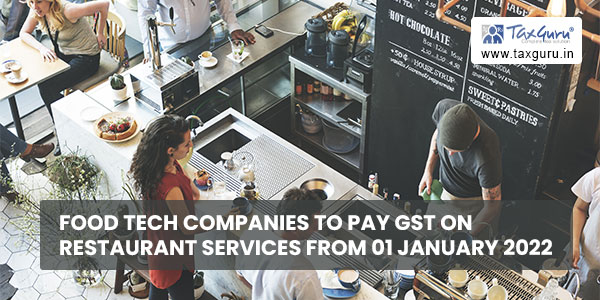E-commerce operators are required to pay GST on certain specified services supplied through their platform as if they are the supplier of such services liable for payment of tax, as per section 9(5) of the Central Goods and Services Tax Act 2017. E-commerce operators are those who own, operate or manage digital or electronic facility or platform for supply of goods or services or both, including digital products over digital or electronic network.
The list of services covered under section 9(5) of the Central Goods and Services Tax Act 2017 are as under:
- Services by way of transportation of passengers by a radio-taxi, motorcab, maxicab and motor cycle, omnibus or any other motor vehicle (Notification No. 17/2017-Central Tax (Rate) dated 28 June 2017 and Notification No. 17/2021-Central Tax (Rate) dated 18 November 2021.)
‘Radio taxi’ means a taxi including a radio cab, by whatever name called, which is in two-way radio communication with a central control office and is enabled for tracking using Global Positioning System (GPS) or General Packet Radio Service (GPRS).
‘Maxicab, motorcab, motor cycle, motor vehicle and omnibus’ shall have the same meanings as assigned to them respectively in clauses (22), (25), (27), (28) and (29) of section 2 of the Motor Vehicle Act, 1988 (59 of 1988).

- Services by way of providing accommodation in hotels, inns, guest houses, clubs, campsites or other commercial places meant for residential or lodging purposes, except where the person supplying such service through electronic commerce operator is liable for registration under sub-section (1) of section 22 of the said Central Goods and Services Tax Act 2017. (Notification No. 17/2017-Central Tax (Rate) dated 28 June 2017)
- Services by way of house-keeping, such as plumbing, carpentering etc, except where the person supplying such service through electronic commerce operator is liable for registration under sub-section (1) of section 22 of the said Central Goods and Services Tax Act. (Notification No. 23/2017-Central Tax (Rate) dated 22nd August 2017)
Restaurant services:
Now the Central Government has included restaurant services under the ambit of section 9(5) of the Central Goods and Services Tax Act 2017 vide Notification No. 17/2021-Central Tax (Rate) dated 18 November 2021.
- Supply of restaurant service other than the services supplied by restaurants, eating joints, etc. located at specified premises.
‘Specified premises’ means premises providing hotel accommodation service having declared tariff of any unit of accommodation above Rs. 7,500 per unit per day or equivalent.
‘Restaurant service’ means supply, by way of or as part of any service, of goods, being food or any other article for human consumption or any drink, provided by a restaurant, eating joint including mess, canteen, whether for consumption on or away from the premises where such food or any other article for human consumption or drink is supplied. (Notification No. 20/2019- Central Tax (Rate) dated 30t September 2019)
The notification will be effective from 1 January 2022.
As per the above notification, food tech companies like Zomato, Swiggy, Uber Eats, etc., will be required to pay GST on supply of restaurant services through their platform as if they are the supplier of such restaurant services. In such cases, restaurants are not required to charge GST.
Exception: The above provision is not applicable for the restaurant services provided by restaurants, eating joints, etc. located at the premises providing hotel accommodation services having declared tariff of any unit of accommodation above Rs. 7,500 per unit per day or equivalent.
Rate of GST: The rate of GST applicable for supply of restaurant service is 5% without input tax credit.
Implications:
- For food tech companies
- Food tech companies will be liable to pay GST on foods supplied through their platform.
- Increases in compliances burden.
- TCS is not required to be collected on the amount remitted to restaurants except when restaurants are liable to pay GST.
- For restaurants, eating joints including mess, canteen
- Restaurants will not be liable to pay GST on foods supplied through e-commerce platforms; however, liability to pay GST on foods served at restaurants or through takeaway or outdoor catering would continue.
- GST registration will become mandatory for restaurants only if their turnover exceeds the minimum threshold limit of Rs. 20/10 lakhs.
- Liability to pay GST will remain on restaurants, not food tech companies if restaurants are forming part of the hotel providing accommodation services having declared tariff exceeding Rs. 7,500 per unit per day.
- For cloud kitchens
- This will give complete relief to the cloud kitchens which operate exclusively through e-commerce platforms. Cloud kitchens will not be required to obtain GST registration even if their turnover crosses the minimum threshold limit of Rs. 20/10 lakhs.





